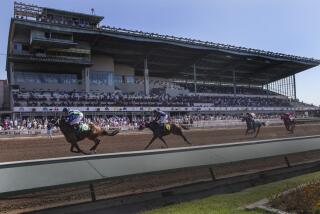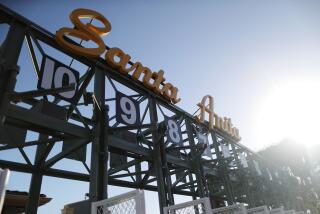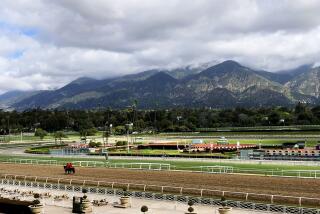This Milkshake Left His Wallet a Little Thin
My father died on Feb. 5 two decades ago, and in tribute to his lifelong quest and failure to find a winning formula at the track, every year on that date I make a horse racing wager in his memory.
We’d be living in a bigger house had he lived longer and made his own bets.
This year I chose the Pick Six on Feb. 5 at Santa Anita because there was a $369,815.37 carryover, and I figured someone was looking out for me. I just knew in my bones that my dad was pouring over the Daily Racing Form -- as boring as it must be up there, just getting a massage every day and playing golf -- and this would be it, the big score.
I combined the selections of different handicappers, ignored Misery’s selections in The Times, paid no attention to the wife’s sarcastic, “good luck,” studied handicapper Bruno De Julio’s racing analysis so I would know who not to bet on and felt so good, I made the largest Pick Six wager I’ve ever placed.
A few minutes later I lost. Never got past the first race. Smuggler’s Run, going off at odds of 28-1, led from start to finish. There’s no way someone could have picked that horse to finish first. I didn’t.
A week later I read that Smuggler’s Run, trained by Vladimir Cerin, had been found in violation of Santa Anita’s “milkshake” rule when it had run on Feb. 5.
A milkshake is mostly baking soda -- as much as a pound -- delivered in the old days by a hose inserted through the horse’s nose and into its stomach. There are more sophisticated ways today, some arguing it can be done effectively through feed and vitamins. The baking soda doesn’t necessarily make a horse run faster, but it staves off fatigue. I know I could run all day if threatened with a hose through my nose.
Instead of giving my money back after announcing that Smuggler’s Run had cheated, Santa Anita announced Cerin was in trouble, and for the next 30 days he’d have to send his horses to a detention barn. Shouldn’t it be Cerin who is sent to detention?
I stopped at the Cerin barn Thursday, and he said, “I am all for this [milkshake] program.”
No matter what question I asked, I got the same answer: “I am all for this program,” even though he was caught breaking the program’s rules.
He had a lime green parrot on his arm. Later I would have difficulty determining who was more repetitive: the parrot or Cerin.
I told him that I blamed him for ruining the tribute to my dad, and he said, “You had no chance” of picking Smuggler’s Run to win, and at first I thought he knew I was my father’s son, and so it’s in the blood we’re not going to ever win at the track.
“Smuggler’s Run had an entrapped epiglottis, and couldn’t breathe,” said Cerin, diverting the conversation away from milkshakes. “He underwent a surgical procedure and now he could breathe. And so he won.”
It would have been nice to know that a horse, who previously gagged down the stretch, could now breathe.... Do you think that’s what happened to Phil Mickelson before the Masters? I would have stopped calling him the “Choker,” had I known.
“No one has any right to know,” Cerin said, “except the owners, who paid for the surgery,” and knowing now that there were only 10 winning tickets in the Pick Six worth $122,169.40 each, I wonder if Cerin, or the horse’s owner, took advantage of the inside info to score big while the public was left clueless?
Funny thing, but the folks at Santa Anita said they want the bettors to have a real shot at picking winners, which explains why they are cracking down on milkshake violators, publicly reprimanding Cerin, Jeff Mullins and Julio Canani.
“The real issue here is that we want to give our fans a fair shake,” veterinarian Rick Arthur said.
As level playing fields go, wouldn’t I rather know which horses can breathe and which ones are going to choke?
“It’s a legitimate question,” said Dr. Arthur, who proceeded to tell me that he doesn’t usually bet, but that the biggest wager he ever cashed was on a horse that underwent breathing surgery and he was one of the few to know.
*
MULLINS IS No. 10 nationally in earnings and one of the top trainers in Southern California for the last three years. When I walked into his office to ask if he was a cheater, I noticed some kind of “teamwork” plaque on the wall.
“So you’re probably not a Kobe guy,” I said.
“I’m not into baseball,” Mullins said, and I thought about mentioning Jose Canseco, but I would imagine he’s also not into tennis.
In his own way, though, Mullins has been kind of the Barry Bonds of horse racing, doing incredible things, which raised suspicions, the same kind of suspicions, as trainer Bob Baffert noted, that Lance Armstrong heard.
“He gets successful, they suggest blood-doping and then they find out he’s just good,” Baffert said.
Horse racing didn’t start taking a hard look at milkshakes and alkaline levels until last summer at Del Mar, and once again Mullins was way out in front of the competition. His horses tested higher than most, which might have explained his competitive edge the last few years, which was all right until officials started introducing new milkshake rules.
“You feed horses oats, hay and water and you’re going to starve here,” said Mullins, and he wasn’t talking about the horses. “We’re in the claiming business, and it’s our job to get these horses happy and healthy again.”
Mullins’ horses were deemed a little too happy according to test results, so they are now being led to the detention barn. Of the 13 horses that have run from the detention barn, one has won for Mullins.
“We’ve had to start backing off the supplements,” Mullins said, and however all this goes, I just hope they’ve got it straightened out by next Feb. 5.
T.J. Simers can be reached at t.j.simers@latimes.com. To read previous columns by Simers, go to latimes.com/simers.
More to Read
Go beyond the scoreboard
Get the latest on L.A.'s teams in the daily Sports Report newsletter.
You may occasionally receive promotional content from the Los Angeles Times.










